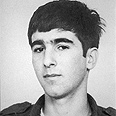
A secret Military Intelligence committee, formed four years ago to determine the fate of captive Israeli Air Force navigator Ron Arad, has determined he died in captivity in the mid 1990s, Yedioth Ahronoth reported Sunday.
A Prime Minister's Office statement rejected the committee's report, saying, "Efforts to find leads in the missing aviator's case are ongoing and until we have conclusive evidence to the contrary, the assumption is the Ron Arad is alive. We are doing everything possible to bring him home."
Arad, an IAF F-4 Phantom navigator, was captured on October 16, 1986 after his plane was shot down over Lebanon. He was captured by the Lebanese Shiite militia Amal and later turned over to Iran.
Arad is believed to have died from an unknown illness after the Iranians returned him to Lebanon, where he was held at a Revolutionary Guards facility. Both Iran and Hezbollah have been unable to locate his gravesite, the report said.
Iran's mysterious pullback
The Israeli Intelligence community has gone to great lengths to try and recover any information regarding Arad. Israel and Amal held Germen-brokered negotiation on the matter for a long period of time, but to no avail.
In 1988, Arad disappeared from the home of the Amal officer guarding him. By the mid 1990s, after it was ascertained the Arad's fate was in Iran's hands, German mediation efforts focused on Tehran.
In 1995, the Iranian ambassador to Germany informed the German mediator that Tehran "was no longer involved. We don’t know who Ron Arad is or where he is. If you think he is in Lebanon or held by Hezbollah, see if Hassan Nasrallah can help you."
The Germans, though aware the case had taken a sudden turn, failed to understand the nature of the change.
Germany continued to broker Israel's attempts to gather information about the missing navigator, and a stipulation to that effect was made part of Israel's 2004 prisoner exchange deal with Hezbollah, but the Shiite group withheld the desired information.
Stage two of the 2004 exchange, which saw the return of the remains of captured IDF soldiers Adi Avitan, Omar Souad, and Benny Avraham, was to include Israel's consent to release convicted terrorist Samir Kuntar in exchange for information on Arad.
Hezbollah said that given the right "incentive" it would be willing to go to great lengths to solve the mystery of Arad's disappearance, but the offer was never actualized.
Only one conclusion left
Iran's supreme spiritual leader, Ayatollah Ali Khamenei, even issued an official decree that Iran would no longer be involved in the case.
Nevertheless, the Israeli intelligence community has been unable to determine exactly how or when Ron Arad died. The committee concluded that he was apparently gravely ill and died after being deprived medical care, but while the majority of its members believe he died in early 1995, others say he probably died in late 1996, or early 1997.
Arad's burial site is unknown, but information in the case is considered highly credible, and there seems to be a consensus that the IAF navigator is no longer among the living.
Nevertheless, the committee is convinced Arad was still alive at least seven years after the last proof of life was given to Israel – in May 1988.
In 2005, Maj.-Gen. Farkash submitted to IDF Chief of Staff Dan Halutz a recommendation to declare Arad a fallen soldier whose gravesite is unknown. Halutz was inclined to accept the recommendation, but heads of the Shin Bet and the Mossad insisted that Israel had to have DNA evidence to declare him as such.
The report was also presented to Prime Minister Ariel Sharon, but he was reluctant to accept its findings.
A committee headed by retired Justice Eliyahu Winograd, which was formed several years ago in order to analyze the intelligence reports in Arad's case, determined that according to the information "it is impossible to unequivocally determine that Ron Arad is dead".
The Arad family was made privy to the findings and issued, via Attorney Eliad Shraga, the following statement: "We operate under the assumption that Ron is alive and Iran is responsible for his fate.
"Even if the report is correct and Ron is no longer alive, we will continue our efforts to bring him home, whether his remains, God forbid, are in Lebanon or in Iran."
Roni Sofer contributed to this report















